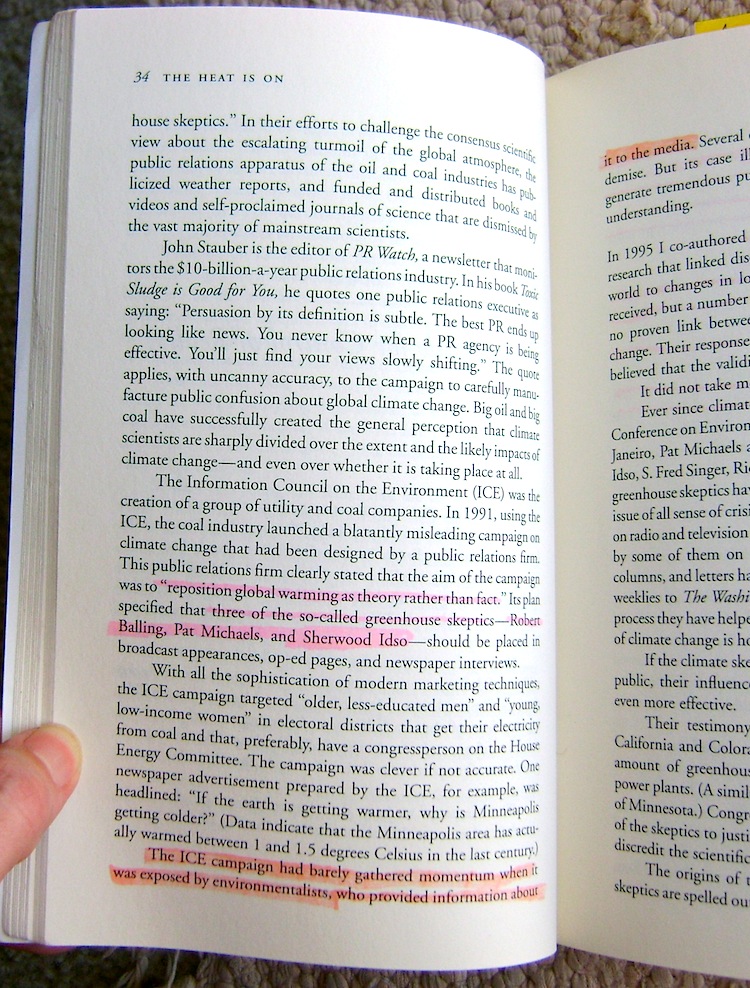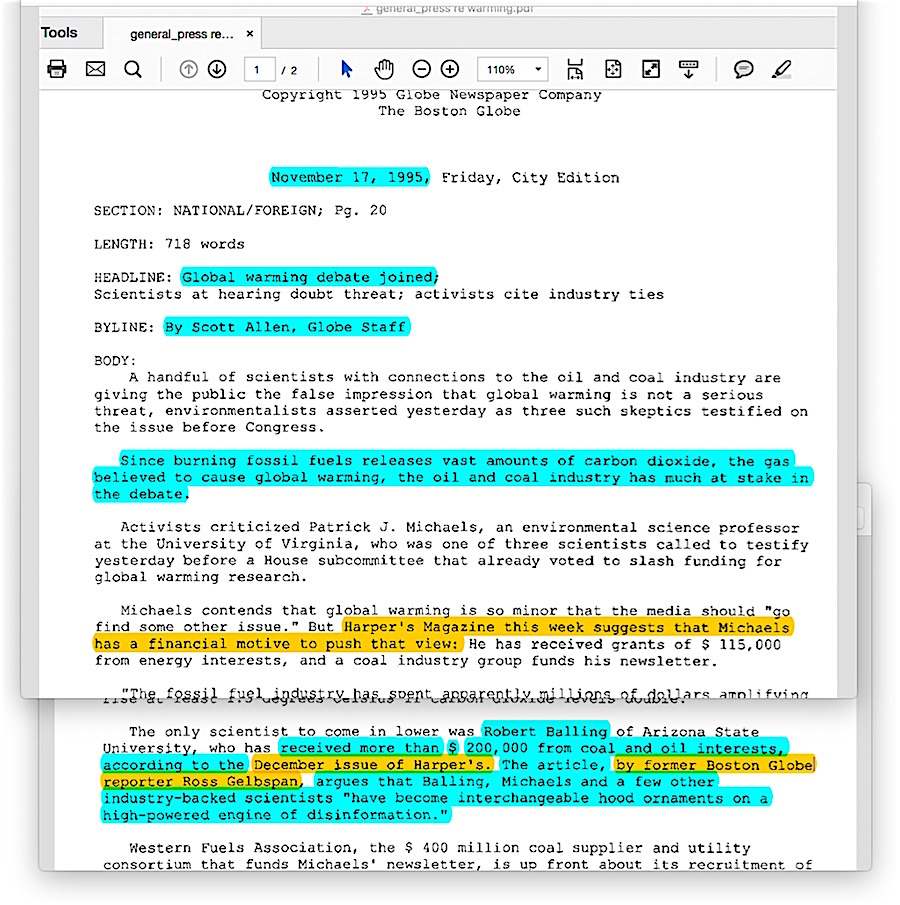You can either accept what reporters say without question, or you can look more deeply into what they say to see if it all lines up in a nice straight problem-free line, or if it ultimately takes on the unavoidable appearance of being an agenda-driven narrative based on disingenuous false premises. The following illustrates how this kind of examination works, on an article which purports to be a criticism of another article but actually turns out to be complementary to it in a rather suspicious way.
The same day that the New York Times Magazine published its epic 8/1/18 “Losing Earth: The Decade We Almost Stopped Climate Change” article, Robinson Meyer at The Atlantic responded with his own piece, “The Problem With The New York Times’ Big Story on Climate Change.”
What’s the problem? Essentially, Meyer concludes,
… any sensible narrative of climate politics has to start and finish with the idea that opposition to climate policy grew in parallel with the scientific case for action. Telling the wrong story makes the case for action look easier than it is.
Carefully sift through Meyer’s piece, and it becomes obvious that his gripe about the NYT writer is that the fellow implied global warming was a problem having widespread agreement about the need to solve it, up until the early 1990s when the fossil fuel industry decided to turn its back on what it supposedly ‘knew’ (actually, Exxon demonstratively did not know, but that’s another story). Meyer attempts to shoot down this ‘late arrival’ of opposition to the certainty of man-caused global warming with this bit of name-dropping:
Robert Brulle, a sociologist at Drexel University who studies environmental policy, noted that Rich’s story did not mention that “climate-science denial efforts” began in 1982, with the publication of Sherwood Idso’s Carbon Dioxide, Friend or Foe.
Sherwood who? This Atlantic article is not a lightweight piece aimed at superficial readers, it assumes they have some intellectual curiosity — but not too much — and that they might wonder at a minimum who Sherwood Idso is. Drop his name into an internet search and what are the top results? The top three will take searchers straight into an unmistakable narrative: he’s a ‘paid shill of the fossil fuel industry.’ The #1 Wikipedia result is just a bit subtle about the effort, but it still gets the job done.
So, there you are, end of story. This Atlantic really ends up looking less like a criticism and more like an effort to hammer home the notion that the evil fossil fuel industry sought to beat down the settled science of man-caused global warming ever since this concern first popped up.
But let’s take a step back: plop the combined names of Robert Brulle and Sherwood Idso into an internet search and one of the more recent results is a 2013 sociology paper by Riley Dunlap and Peter Jacques which mentions Dr Idso’s “Friend or Foe” book and its publication date, while thanking Robert Brulle for input into their paper. Who is the source for this 2013 paper about the idea of ‘industry manufacturing doubt?’ David Michaels and Naomi Oreskes. Now, while their individual books don’t cite him directly, each — Michaels (full text here) and Oreskes — rely on Ross Gelbspan as someone who exposed the ‘corruption’ of skeptic climate scientists.
It doesn’t end there. Back in 2008 in another paper, these same two sociologists, Dunlap & Jacques, did the same thing: They mentioned Dr Idso’s book and its publication date, and they thanked Brulle. In this older paper, however, they were a little more direct for their citation insinuations about corporate-corrupted skeptic climate scientists. They even went so far as to note Gelbspan’s supposed role in illustrating the unnecessary effort to give fair media balance to skeptic scientists …. and Brulle’s. The irony there is the Brulle citation is for his 2003 paper which ………………. gets no farther than the first page without citing Gelbspan’s June 2000 industry corruption accusation presentation. Gelbspan’s presentation not only repeated the worthless core ‘evidence’ that’s long been used to indict skeptic climate scientists of industry-paid corruption, it also repeated three scientist names originating from the 1997 version of his “The Heat is On” book.
Not the 1998 paperback version where Gelbspan made the unexplained name swap of ……. Sherwood Idso.

Was there a reference earlier than the 2008 Dunlap & Jacques paper to Dr Idso’s 1982 book? Yes, Spencer Weart’s 2007 supplement website pages (for his own short book), where Idso’s book is described as “friendly” ….. and where Ross Gelbspan is seen further down the page as someone who castigates the media for the unnecessary effort to give fair media balance to skeptic scientists. Weart’s end note for that latter item includes a 2004 paper by the Boykoff brothers …. who essentially admit the whole premise of their paper is based on Gelbspan’s assertion about unnecessary media balance, while citing his role* in ‘exposing crooked skeptic scientists,’ and thanking him for his input. ( * the other Jeremy Leggett book citation there is actually an enormous problem for Gelbspan’s credibility)
See the pattern developing here? My January 16, 2014 post “Robert ‘dark money’ Brulle & Other ‘Skeptic-Trashing Environmental Sociologists’” details many of the names seen as citations in the Dunlap & Jacques papers, except Peter Jacques himself. So, to illustrate how silly the citation cascade is when it comes to the ‘crooked skeptics’ accusation always spiraling back to one source, witness this passage from Jacques’ 2009 book:
… there has been multiple corroborated layers of material connections brought to the fore by investigative journalists from different perspectives surrounding climate denial, conservative state officials, think tanks and industrial networks (Gelbspan, 2004, Mooney, 2005….
Mooney’s 2005 “Some Like It Hot” Mother Jones article doesn’t name Gelbspan as the source for the accusation (he instead appears in an online side note piece about the unnecessary effort to give fair media balance to skeptic scientists, which includes a key item), but one of its key assertions was one that Al Gore later repeated, while adding a tie-in straight to Gelbspan:
Exxon Mobil has funded 40 different front groups that have all been a part of a strategic persuasion campaign to, in their own words ‘reposition global warming as theory rather than fact.’
Meanwhile, Mooney’s 2005 “Republican War on Science” book does cite Gelbspan, as does the old Boston Globe newspaper reference within Mooney’s book citation.

As these sociologists (none of whom having climate science expertise to back their premise about ‘settled climate science’) inadvertently demonstrate, all paths lead to Ross Gelbspan — whether it was a month ago or a decade ago — when it comes to the premise that ‘multiple corroborated layers of material connections’ confirm skeptic climate scientists are ‘industry-corrupted.’ Word to the wise who are corporate investigators, congressional investigators, or unbiased objective reporters: where does the path lead back, once you get past Gelbspan?
